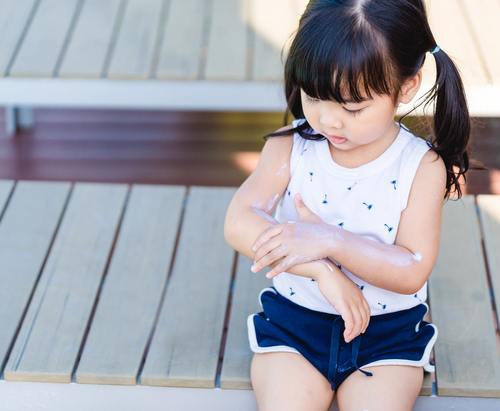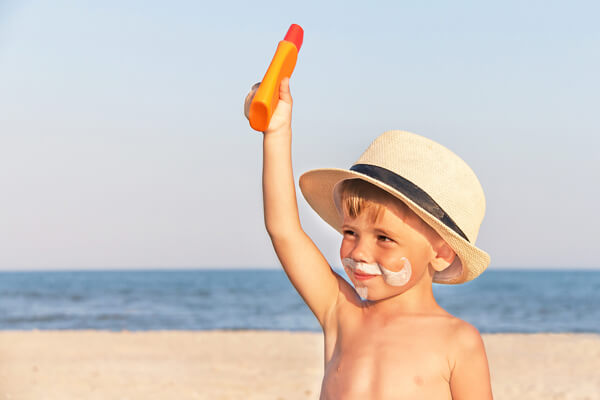In Australia, the sun’s rays can be particularly harsh and embracing SunSmart practices is crucial for everyone to stay safe. With meteorologists predicting El Niño for the upcoming summer period, which means hot, dry waves, being SunSmart should be front of mind for educators and parents.
As early childhood educators, creating a safe and nurturing environment for children to play, learn, and grow is at the top of our list of priorities. When it comes to the warmer months in particular, an important aspect of providing care for children centres around being SunSmart in early childhood education.

Top strategies for staying SunSmart in early childhood
To stay smart in the sun we need to combine knowledge with practical strategies. The knowledge aspect comes down to understanding the risks of excessive sun exposure, especially when it’s hot.
Excessive sun exposure combined with physical activity can increase the risk of sunburn, dehydration, and heat-related illness, such as heat cramps, heat exhaustion, and heatstroke. By being aware of these risks and implementing SunSmart practices, caregivers and educators can help protect children throughout summer.
We all likely recall the Slip, Slop, Slap messaging, but let’s be reminded that there’s a little more to it. These tips can help you integrate sun safety into early learning services:
Understanding UV levels: UV (ultra-violet) rays are the invisible electromagnetic radiation emitted by the sun. The level of UV being emitted by the sun on any given day is what contributes to our risk of sunburn outdoors and is it measured on the solar UV index scale of 0 (low UV) to 11+ (extreme UV). Downloading a weather app that provides these measurements each day, such as the one provided by the Australian Bureau of Meteorology enables you to keep an eye on the UV levels and plan accordingly. For example, the BOM Weather app provides real-time UV index updates, helping educators make informed decisions about outdoor activities. Aim to schedule outdoor play when UV levels are lower, typically early in the morning or late in the afternoon.
Sunscreen essentials: Sunscreen with at least SPF 30 should be a staple in your sun safety toolkit. Apply sunscreen generously to all exposed skin, and don’t forget to reapply every two hours – more frequently if children are swimming or sweating. Make sunscreen application a fun and engaging activity.
Protective clothing matters: Encourage children to wear sun-protective clothing, including t-shirts, hats and sunglasses. Opt for clothing with a UPF (Ultraviolet Protection Factor) rating for added sun protection where possible. Wide-brimmed hats that shade the face, neck, and ears are particularly effective. Implement a hat-wearing policy during outdoor activities to make it consistent and simple for children to follow.
Seek shade: When possible, organise outdoor play areas strategically to maximise natural shade. Set up portable shade structures for added protection during peak sun hours. Educators should actively guide children towards shaded areas, fostering the understanding that shade provides a cooler and safer play environment.
Inclusive education and awareness: For educators working with children from diverse backgrounds, it’s crucial to emphasise the unique challenges posed by the Australian sun. Create informational materials and conduct workshops to raise awareness about the importance of sun safety in Australia for all families to be able to access. Posters around the service and mentions in your newsletters or communications app can help too.

Resources for early childhood educators to be SunSmart
There are many resources can you access to serve as powerful tools in conveying the importance of sun safety for educators, parents, and even children.
Over at the Cancer Council website you can download the National SunSmart early childhood sun protection policy, which can help early learning services to have a written document for all to understand the ins and outs of how you protect children (and your team) from the sun.
Children are never too young to gain a better understanding of how stay safe in summer, and this collection of videos around being SunSmart help to make this important message engaging, age-appropriate, and fun. You can find more SunSmart early childhood education resources here, including posters, online learning tools and more.
Being SunSmart in early learning services is not just about protecting children from sunburn – it’s about instilling lifelong habits that promote health and wellbeing. Let’s work together to create a sun-safe environment where children can learn, play, and thrive in early childhood education settings and beyond.
For more information about our courses or the sector, get in touch.


